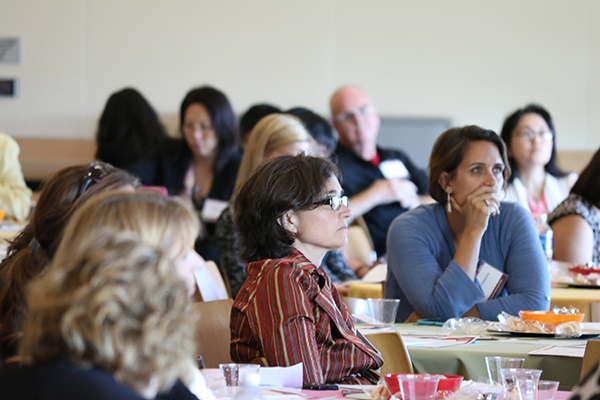Sharing knowledge and making connections is one of the best things about the National Symposium for Academic Palliative Care Education & Research – and this year that’s truer than ever.
More Opportunities to Engage
For the first time, the Symposium will host Paper Sessions, allowing select educators, researchers and clinicians to present compelling research studies created across multiple disciplines.
The Paper Sessions – as well as increased participation in Poster Sessions, where research is displayed in exhibit format so guests can peruse it and chat with authors – means expanded, exciting learning opportunities for Symposium attendees.
More Ways to Advance Care
“Research is the lifeblood of the academy,” said Adam Shapiro, Ph.D., Director of University Relations & Research at the CSU Shiley Institute for Palliative Care. “With our Symposium, we are creating a space in which to dialogue about the latest developments in the field with other professionals. These opportunities in a relatively small but burgeoning field are essential for its growth.”

Some examples of work that will be presented during the Paper Sessions include:
- A presentation by M. Murray Mayo, PhD, APRN, ACHPN, of Ursuline College, on Interactions between Clinicians and Adolescents with a Parent Receiving Hospice. This paper examines the logistical obstacles in providing support for adolescents whose parents are in hospice, and ways that are effective in offering that support.
- A presentation by Brian D. Carpenter, PhD, of Washington University, on Developing Workforce Capacity: Engaging Individuals in Palliative and End-of-life Care across the Spectrum of Education. This author discusses pedagogical strategies that are useful for engaging students in palliative care as well as strategies for addressing potential barriers to building and sustaining interest (career opportunities, funding mechanisms, misperceptions).
- A presentation by Kiarash Noorizadeh, MD, Eisenhower Medical Center, and Rose Yun Li, MD, PhD, Eisenhower Medical Center, on the Impact of Interdisciplinary Palliative Care Program in Patients with Life-limiting Disease. This group hypothesized that interdisciplinary palliative care (IPC) consultations had the capacity to reduce ER visits, total length of hospitalization and 30-day readmission rates. Their presentation describes the design and implementation of an economically sustainable IPC program that enables the seamless transition and continuation of care by the IPC team from hospitalization through post-discharge.
- A presentation by Bruce L. Arnold, PhD, University of Calgary, Linda L. Lloyd, DrPh, MPH, a public health consultant, and Charles F. von Gunten, MD, PhD, of Ohio Health, on Using Visual Methods for Reflection Processes in Palliative Care Education. This paper describes the researchers’ work with first-year palliative medicine physician fellows, aimed at helping the fellows gain personal and professional skills for hopeful and peaceful perceptions of death and dying.
Still Time to Register!
The National Symposium for Academic Palliative Care Education and Research, being held in North County San Diego September 28-29, 2017, gathers clinicians and faculty whose work incorporates ways to reduce human suffering caused by serious, chronic, or life-threatening illness.
If you teach or precept, this conference can provide tools, from music therapy to improving cultural competence, from improving patient decision-making through measurement of geriatric frailty to conducting advance care planning conversations, that you can apply immediately in your teaching, research, or practice.
For more information, call 760-750-7289 or visit the Symposium page.




